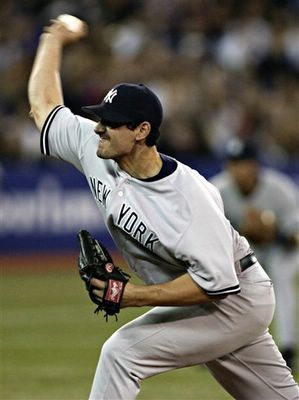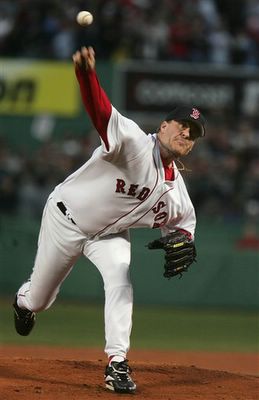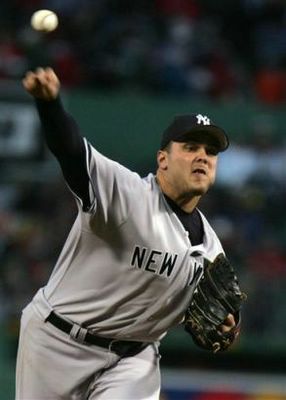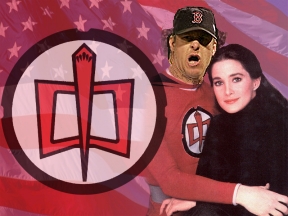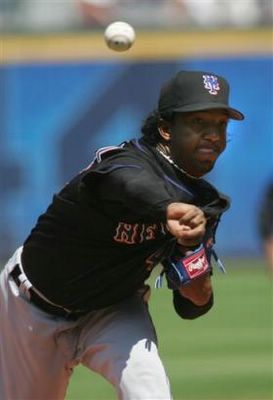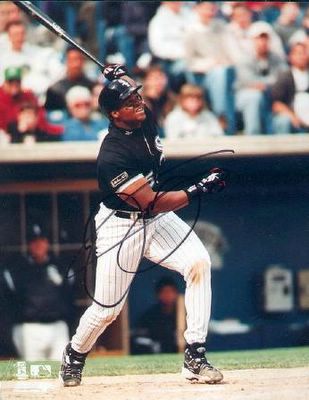Alex Rodriguez had the most productive night of his career last night, driving in 10 runs with three homers and an RBI single in a 12-4 pounding of the Los Angeles Angels of Anaheim, which is still a stupid name. 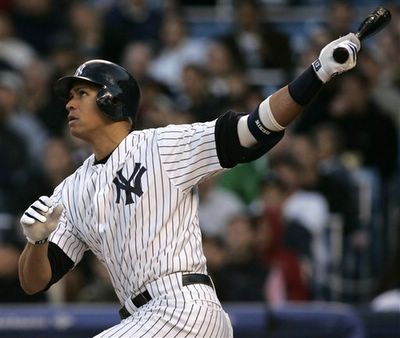
Alex Rodriguez 
The Yankee thirdbaseman had been hitting a respectable but unimpressive .280 with 4 homers and 15 RBI entering the game, but earned himself a whole lot of respect his performance last night. It was the third three-homer game or A-Rod's career, having previously accomplished the feat for both Texas and Seattle. I wonder how many other players have had three-homer games for three different MLB teams... The ten RBI was a personal record for A-Rod, who had previously driven in 7 runs for Seattle twice, but never more.
Naturally, these accomplishments should be taken with a grain of salt, lest we risk dubbing Alex "Mr. April". Most Yankee fans certainly won't soon forget or forgive A-Rod's 2-for-17 performance in the last four games of the 2004 ALCS against Boston, but performances like the one he had last night will certainly help buy him some time to redeem himself.
Historically, Rodriguez usually does pretty well in April, hitting .320/.401/.616, with his highest OBP in any month, and generally somewhat better than his career line of .305/.381/.574. The problem is that in September he has hit "only" .267/.357/.506. Not that an .863 OPS is terrible, not by any stretch. It's just that when 55,000 people go to a game expecting to see "Alex Rodriguez" and all they get is Craig Wilson, well, let's just say they can get a little irate.
All three of the bombs came off Angels starter Bartolo Colon, whom I am very grateful I forgot to pick up for my fantasy team yesterday. Colon entered the game 3-1 with a 2.60 ERA, having given up only one homer (to KC Royals rookie Ruben Gotay, if you can believe that) but after it took him 101 pitches to get through fewer than 4 innings of work agains the Yankees, Colon's ERA had jumped to 3.73.
I heard part of the Yankee broadcast on 880 WCBS out of NY last night, actually getting out of my car just before Alex's first homer of the night. Yankees announcer Suzyn Waldman mentioned that Colon has always had great "stuff" but that he tends to suffer lapses in concentration, making him something less than the pitcher his talent would portend. The argumant, such as it goes, is that Colon has trouble "gearing up" for the likes of the Royals, but no trouble getting himself prepared for the Yankees. So I looked into this, and not surprisingly, the conventional wisdom is not so wise.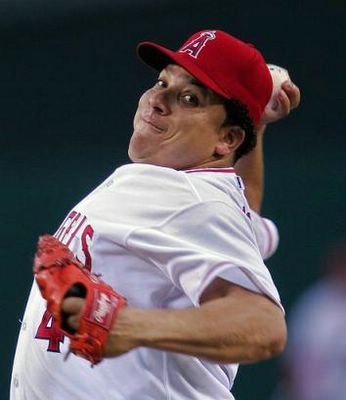
Colon 
I looked at the winning percentages of teams over the span of time that Colon has been in the majors, from 1997-2004, using Baseball-Reference.com's schedule breaker-outer, to get a general idea of the qualities of the teams he's faced. A more accurate way to do this would have been to use the individual winning percentages from each season, as some teams that were bad in 1997 are now good (like the Twins and A's) and vice-versa (Baltimore, for example). But that sounds like a real time-consuming pain in the neck, so you're just going to have to suffer through my half-assed analysis with me.
W L CG SHO IP H/9 HR/9 BB/9 K/9 ERA WHIP
-500 72 35 13 2 909.2 8.48 0.97 3.37 7.35 3.91 1.32
+500 49 41 15 5 718.2 8.87 1.15 3.36 6.99 4.12 1.36
The top line is Colon's combined performances against teams that have been, on average, sub-.500 for the years 1997-2004. The second line is for teams with a combined winning percentage over .500 for that span. (2005 is not included.)
Is it just me, or do those lines look pretty similar? He's got about 200 more innings against "bad" teams, owing to about 30 more games pitched, but all the averages per nine innings are very close. If anything, these numbers seem to show that he pitches better against bad teams, as most pitchers do (that's why they're bad teams), with slight edges in hit rate, home run rate, and strikeout rate providing an ERA not quite two-tenths of a run lower. And of course, better run support against "bad" teams gives him an impressive 67.3% winning percentage against them, compared to only 54.4% against "good" teams.
For the record, I don't think Colon is on his way to another 5.01 ERA for the year. Last season's stats were rathey flukey in that he gave up almost a hit more per 9 innings than he typically does, and his home run rate was a little high as well. If he can keep that one extra batter per game off the basepaths, there's no reason he can't win another 18 games with something like the 3.73 ERA he now sports.
And as for Alex Rodriguez, look for him to return to MVP-like form this year, leading the Yankees in most offensive categories, even if it does take him two weeks to drive in his next ten runs.

